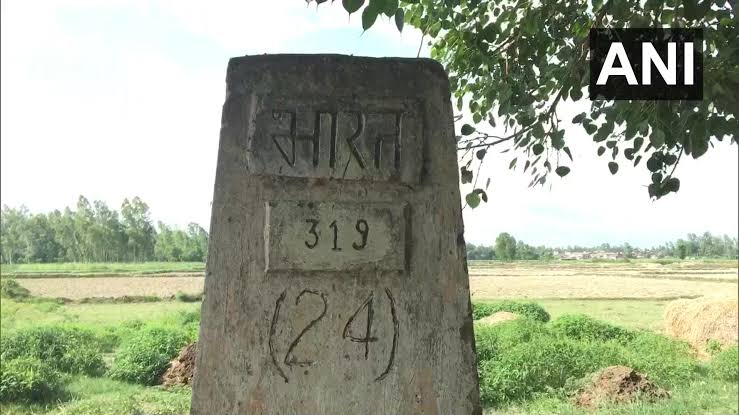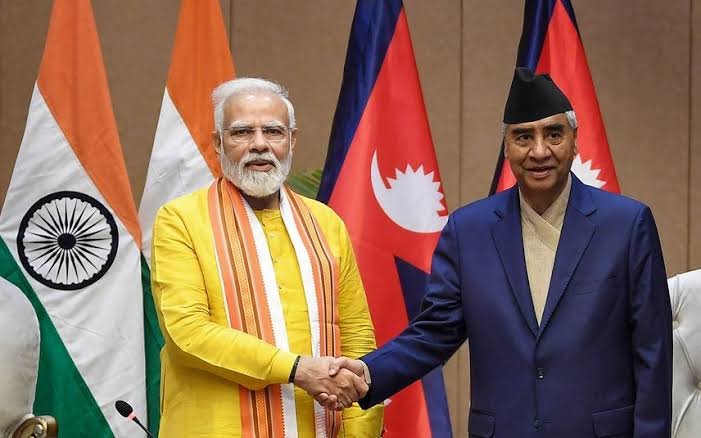
Sagar Suraj
Nepal and India's relationship is complex, with both nations sharing historical and cultural ties, but also experiencing tensions and frustrations. India has been supportive of Nepal during times of crisis, such as the 2015 earthquake, providing rescue efforts and rehabilitation aid. India's financial contributions to Nepal's development have also been significant, with a 29.41% increase in annual grants in 2022-23 and an allocation of Rs 8.8 billion in the 2023-24 budgets.
Thousands of Gorkha soldiers are still serving in the Indian army and the money they earned would be invested in fostering their family back in the Himalyan Nation. Families of either country can freely work in either nation and the 1800 km long porous border helps them to do so. Nepal’s citizens prefer Bollywood movies and songs. Thus, Indian cultures have largely influenced Himalyan people. Both the nations share their cultural and social ties since its inception.

But question remains: who instigates Nepal against India- the country, which would foster Nepal- a landlocked nation, the country, which good gesture for its Himalayan neighbor has always been appreciated across the world. Have Nepal’s diplomats, media or China been winding up anti-india sentiments in Nepal or other factors are behind all this.
However, several issues have caused strains between the two nations
- Border Disputes
The India-Nepal border dispute is a complex issue that's been simmering for decades. The main point of contention is the 1,850-kilometer open border, which has seen territorial disputes and encroachments by Nepali security forces into Indian lands, resulting in killings and extortion of Indian citizens.
- Kalapani: A 35 square kilometer area at the trijunction of India, Nepal, and China, where India claims the Kali River originates in the Pankhagad rivulet, while Nepal asserts the Lipu Gad river is the Kali River.
- Susta: India claims around 100 square km area of Susta in West Champaran district of Bihar has been encroached by Nepal.
- Limpiyadhura, Lipulekh, Mechi, and Tanakpur : Both countries claim encroachment by the other.
Nepal's recent actions, such as including disputed territories in its new currency notes, have escalated tensions. India has called on Nepal to honor sovereignty, engage in dialogue, and abstain from making baseless claims.

The dispute's roots lie in historical uncertainty and contrasting views on border delineations. Nepal cites historical treaties and cartographic evidence, while India retains control, citing historical precedence and strategic necessity.
To resolve this, India and Nepal must prioritize communication and mutual respect. India should utilize its historical ties with Nepal to persuade the new leadership that China's intentions are exploitative. A proactive dialogue and diplomatic solutions are crucial to address territorial disputes and geopolitical tensions.
Dispute over Buddha Birth Place
The dispute over Buddha's birthplace has been a longstanding issue between India and Nepal, with strong emotions running high, especially in Nepal, which has a significant Buddhist population. In 2013, Indian media sparked protests in Nepal by suggesting Buddha was born in India. This led to Nepalese youth taking to social media and the streets to express their discontent.
India's External Affairs Minister, S. Jaishankar, further fueled the controversy in 2020 by describing Buddha as one of the greatest Indians ever. Nepal's foreign ministry quickly responded, pointing out that historical and archaeological evidence confirms Buddha's birthplace as Lumbini, Nepal. India's External Affairs Ministry spokesperson later clarified that Jaishankar's remarks referred to the shared Buddhist heritage between India and Nepal .
Despite these tensions, most scholars agree that Buddha was indeed born in Lumbini, Nepal around 623 BC. Lumbini is recognized as a UNESCO World Heritage site and is considered the birthplace of Buddha and the foundation of Buddhism.
Interestingly, India has been using Buddhism as a soft power tool in its diplomacy, highlighting its historical ties to other nations. India's Prime Minister, Narendra Modi, visited Lumbini in 2022, accompanied by Nepal's Prime Minister, Sher Bahadur Deuba, to lay the foundation stone for the India International Center for Buddhist Culture and Heritage.
India and Nepal disagree over Buddha's birthplace, with India suggesting it's in India and Nepal asserting it's in Lumbini, Nepal.
- Historical Evidence: Nepal's foreign ministry cites historical and archaeological evidence to support Lumbini as Buddha's birthplace.
- Shared Buddhist Heritage: India's External Affairs Ministry emphasizes the shared Buddhist heritage between India and Nepal.
Similar situation was raised in 2021, when Nepal’s PM KP Sharma Oli claimed that Sri Ram-the Hindu Deity born in ‘Ayodhyapuri’ located in Birgunj city in Nepal- thousands of km away from Ayodhya of India where Sri Ram was actually born and brought up.
"Big Brother" Behavior: Nepalis object to India's perceived "micromanagement" and framing of Nepal as India's "young brother." Nepal, as the oldest sovereign country in South Asia, values its independence and sovereignty.
- Unequal Diplomatic Agreements: Nepal's public perceives agreements like the Gandaki, Koshi, and Mahakali water treaties, and the 1950 Peace and Friendship Treaty, as benefiting India more. Many Nepali politicians advocate revising these treaties to ensure equality.
Trade Blockades have been a major point of contention, with India imposing blockades in 1975, 1989, and 2015. The 2015 blockade, which occurred after the earthquake, led Nepal to sign a trade and transit agreement with China. This blockade also caused severe fuel and medicine shortages, isolating Nepal from the rest of the world.
“Nepal's Constitution and Madhesi Ethnic Minorities” is another issue. Nepal's new constitution marginalized Madhesi ethnic minorities, who are culturally close to India. This led to violent protests and demands for India to intervene in 2015. India's response was to launch a massive blockade, which further exacerbated tensions.
“Geographical Disadvantages” also play a role in Nepal's tensions with India. As a landlocked nation, Nepal relies heavily on India for imports, including petroleum. India's control over Nepal's borders and trade routes has led to feelings of frustration and dependence.
“China's Influence” is also a factor, with Nepal seeking to balance its relationships between India and China. Nepal remained in bargaining mode, has signed trade agreements with China and receives financial aid from both nations.
It's clear that this sensitive issue requires careful diplomacy to resolve. By acknowledging the shared cultural significance of Buddhism, India and Nepal can work towards strengthening their ties and promoting regional peace.
Despite these tensions, recent developments suggest a thawing in relations. Nepal's Foreign Minister Dr. Arzu Rana Deuba's visit to India in August 2024 marked a new achievement in energy trade, with Nepal importing an additional 251 MW of electricity from India. This cooperation aligns with Indian Prime Minister Narendra Modi's vision of regional development through economic collaboration.
In summary, while India has been supportive of Nepal in times of crisis, several issues have contributed to tensions and frustrations between the two nations.
It's essential for both nations to address these underlying issues to strengthen their relationship, focusing on mutual benefit and respect for sovereignty.
(Author is editor in chief of Border News Mirror)
Related Posts
Post Comment
राशिफल
Live Cricket
Recent News
Epaper
YouTube Channel
मौसम












.jpg)




Comments